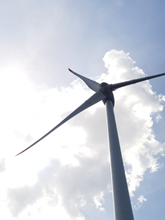Onderzoek naar publieke acceptatie van de energietransitie

Hoe kunnen inwoners van de provincies Groningen en Zuid-Holland betrokken worden bij de besluitvorming over regionale energiestrategieën? Die vraag staat centraal in het nieuwe onderzoeksproject RESPECT van de Groningse onderzoekers Goda Perlaviciute, Lorenzo Squintani en Linda Steg. Recent ontvingen zij een grote NWO-subsidie voor dit onderzoek. Naast dit onderzoek naar de energietransitie op regionaal niveau, start binnenkort ook een groot Europees onderzoek naar de publieke acceptatie van negatieve emissie-technologieën, zoals het afvangen en opslaan van CO2.
Publieke weerstand kan een grote uitdaging zijn voor de uitvoering van duurzame energieprojecten, zoals windmolenparken. Omgevingspsycholoog Goda Perlaviciute van de Faculteit Gedrags- en Maatschappijwetenschappen en Lorenzo Squintani van de Faculteit Rechtsgeleerdheid onderzoeken of en hoe het betrekken van mensen bij de besluitvorming kan leiden tot betere energieprojecten en het vergroten van draagvlak voor deze projecten. Om de publieksparticipatie in besluitvorming te onderzoeken, hebben zij het Like!Me Living Lab opgericht met meerdere maatschappelijke partners.
Regionale energiestrategieën in Groningen en Zuid-Holland
Voortbouwend op het onderzoek in het Like!Me Living Lab ontvingen zij onlangs een NWO-subsidie (500.000 euro) voor een nieuw onderzoek naar de vraag hoe het publiek kan worden betrokken bij de besluitvorming over regionale energiestrategieën in de provincies Groningen en Zuid-Holland. Perlaviciute, Squintani en Steg werken in dit project met als titel RESPECT samen met lokale overheden, bedrijfsverenigingen en kennisinstellingen.
Publieke acceptatie van controversiële negatieve emissie-technologieën
Naast de overstap naar duurzame energie kunnen er ook andere oplossingen nodig zijn voor een duurzame energietransitie, zoals het afvangen en opslaan van CO2. Deze zogenaamde negatieve emissie-technologieën verwijderen CO2 uit de atmosfeer, waardoor de klimaatverandering en de negatieve gevolgen daarvan worden verminderd. Binnen het Europese project "NEGEM", dat geleid wordt door het VTT Technisch Onderzoekscentrum van Finland, zullen Goda Perlaviciute en Linda Steg een grootschalig intercultureel onderzoek coördineren naar de publieke acceptatie van negatieve emissie-technologieën. Zij zullen in dit project samenwerken met wetenschappers uit andere disciplines, waaronder klimaatwetenschappers van het Potsdam Institute for Climate Impact Research.
Meer informatie:
- NWO nieuwsbericht
- Like!Me Living Lab
- Profielpagina Goda Perlaviciute
- Profielpagina Lorenzo Squintani
- Profielpagina Linda Steg
Meer nieuws
-
20 januari 2026
Alcohol, appen en e-bikes
-
13 januari 2026
Lonneke Lenferink nieuw lid van De Jonge Akademie
-
08 december 2025
Kleurrijke Kopstukken: Bert Röling
